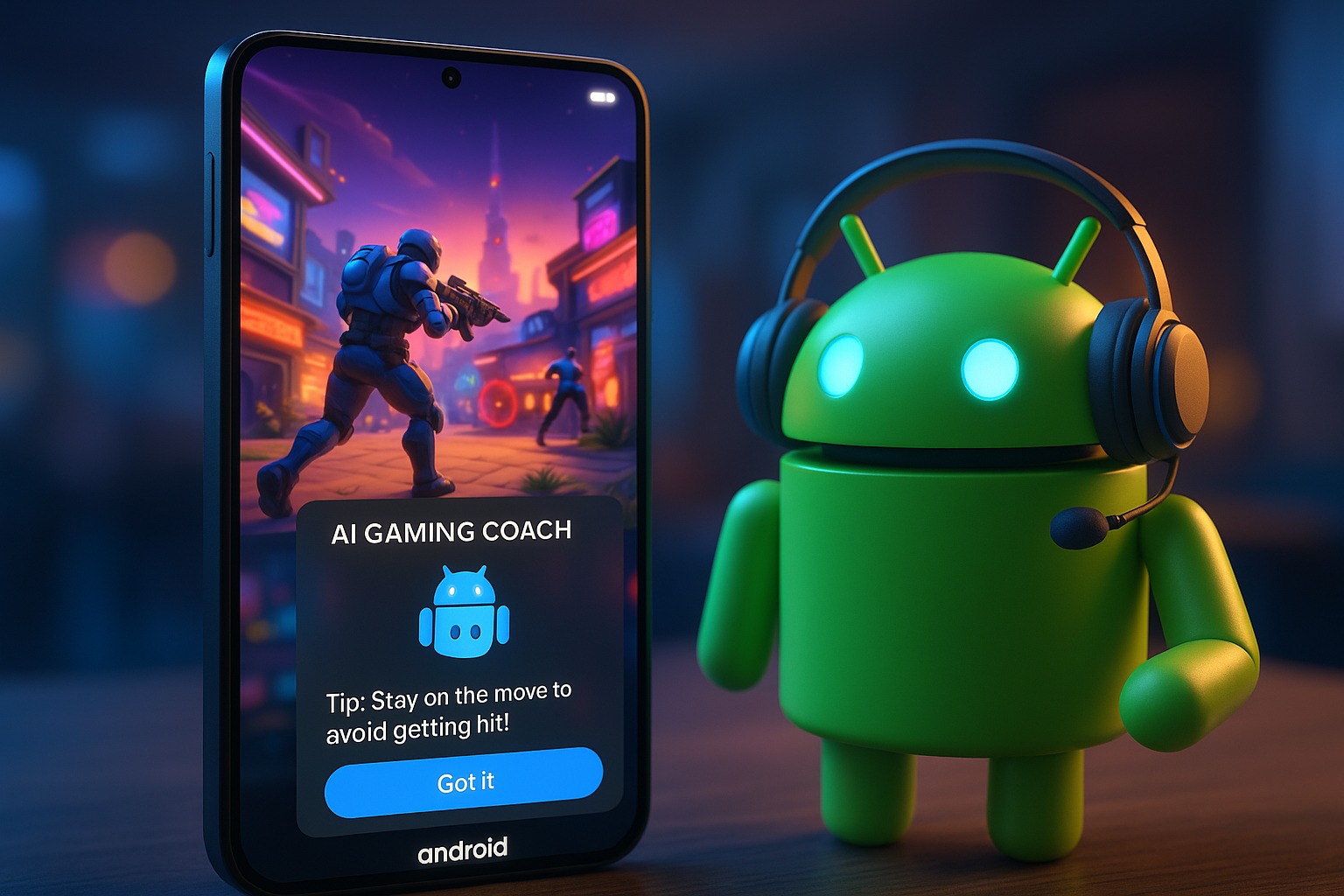Table of Contents
Imagine you’re stuck on a tricky level in a mobile game. Normally, you’d pause, open a browser, and search for a walkthrough, which takes time and breaks your flow. Now picture asking an AI for help while you keep playing, and getting tips spoken back to you in real time. That’s exactly what Google is rolling out for Android: an in-game AI coach that watches what’s happening and gives live, helpful guidance — no switching apps required. This blog explains what the new feature is, what it can do, how it will work, and why it matters for players and creators alike — in plain, friendly language.
https://marioschumacher.com/diegopons-videoblogger-viajandocondiego/ What Google announced in the short version
Google is adding an in-game AI assistant for Android games that gives players live tips, strategies, and help without leaving the game screen. The new tool uses Google’s Gemini AI (sometimes shown as Gemini Live) and will appear in certain games as an overlay or “sidekick.” It can listen to voice commands, view your screen to understand the game context, and reply with spoken suggestions. The feature will launch in select games over the next few months.
Why this is a big deal (in simple words)
- Buy Carisoprodol Online No more pausing to search. When the AI can “see” your game and tell you what to do, that saves time and keeps the fun going.
- Live and voice help. You can talk to the coach and get spoken tips back, so your hands stay on the controls.
- https://pacificsundental.com/services/ Smart context-aware advice. Because the AI can analyze what’s on your screen, its tips can be specific to your exact situation instead of generic hints.
https://reachrehab.co.uk/birmingham/ What’s the new feature called? (Names you’ll see)
Google’s announcements use a few related names and labels, so you might see any of these in places that cover the news:
- https://medmanor.in/products/ Gemini Live — Google’s multimodal AI tool that can “watch” and respond to screen content.
- Tramadol Online Purchase Play Games Sidekick — the name some outlets use for the in-game overlay that brings Gemini Live into Android games.
Both names point to the same idea: an in-game AI helper that gives timely, context-aware coaching while you play.
New features that the AI gaming coach can do
Here’s a plain list of the new features Google is bringing to Android gamers, with short explanations and why they matter:
- http://www.belico.co.uk/bespoke/ In-game overlay / Sidekick window https://sumanpsychiatryhospital.com/ect/
- A small window appears on top of your game (an overlay). You don’t have to leave the game to use the assistant. This makes help quick and non-intrusive.
- A small window appears on top of your game (an overlay). You don’t have to leave the game to use the assistant. This makes help quick and non-intrusive.
- Tramadol Online Purchase Real-time, context-aware tips
- The AI “sees” the game screen (via a permission/ screen share) and gives advice based on what’s happening — for example, “Try aiming slightly higher” or “Use that item now.” It’s not generic; it’s tailored.
- The AI “sees” the game screen (via a permission/ screen share) and gives advice based on what’s happening — for example, “Try aiming slightly higher” or “Use that item now.” It’s not generic; it’s tailored.
- Voice and text input
- You can ask for help by speaking or typing. The coach responds with spoken answers (so you can keep playing) or text if you prefer.
- You can ask for help by speaking or typing. The coach responds with spoken answers (so you can keep playing) or text if you prefer.
- https://itxasofisio.com/privacy-policy/ Screen sharing to understand the game context Order Klonopin Online
- Gemini Live uses live screen data to figure out what you need. This means the assistant can identify levels, maps, enemies, and other on-screen clues to offer accurate tips.
- Gemini Live uses live screen data to figure out what you need. This means the assistant can identify levels, maps, enemies, and other on-screen clues to offer accurate tips.
- Quick actions and gaming tools
- The overlay can also include buttons for screenshots, screen recording, streaming (to YouTube), and quick access to achievements or game stats — useful for sharing or saving moments.
- The overlay can also include buttons for screenshots, screen recording, streaming (to YouTube), and quick access to achievements or game stats — useful for sharing or saving moments.
- Rollout to select games first
- Google will test and roll out the feature for a handful of games at first, then expand over time. This staged launch helps the company tune the assistant for different game types.
- Google will test and roll out the feature for a handful of games at first, then expand over time. This staged launch helps the company tune the assistant for different game types.
- Integrated with Play Store updates
How it actually works (a friendly, simple tour)
- Start your game. When you open a supported game, a small “Start Sidekick” or Gemini Live button may appear.
- Grant permission to share the screen. The overlay needs to see your game screen (this is like starting a screen share) so the AI understands context. You’ll be asked to allow that.
- Ask for help. Say “Hey Sidekick, how do I beat this boss?” or type the question.
- Get spoken advice and tips. The assistant analyzes the screen and your question, then gives clear, short directions — typically spoken — so you can take action without leaving the game.
- Use quick tools. Want to record a clip, take a screenshot, or check achievements? Tap the overlay buttons.
Who is this for? (Players, creators, or both)
- Casual players: Great for people who don’t want to grind or read long guides — just want quick help.
- Competitive players: Useful for polishing small mechanical habits (aiming, timing) with instant feedback.
- Streamers & creators: Built-in recording and share tools make it easy to capture and stream memorable moments.
- Game developers: A new place for in-game help and tutorials — developers could design experiences that work well with the Sidekick overlay.
Privacy and safety: what to watch for
Because the feature uses live screen data and voice, Google will need to handle privacy carefully. Here are important points to know or ask about:
- You control screen sharing. The overlay needs permission to view your screen. You should be able to start and stop that anytime.
- Sensitive info concerns. If a game shows personal details (chat messages, account info), users should be aware the overlay could technically see them during a session — permission and transparency matter.
- Data use & retention. Google will likely explain how it stores or uses any screen/voice data (for improving Gemini or for other purposes). Read the privacy notice before signing up.
How this fits into the bigger AI & gaming picture
- AI agents are moving into entertainment. Google already uses Gemini for productivity tasks. Bringing Gemini into games shows AI models expanding into real-time entertainment help.
- Competes with other in-game AI helpers. Microsoft and others are experimenting with in-game guides and overlays — expect competition and faster innovation.
- It could change how people learn games. Instead of long videos, players might prefer short, spoken tips tailored to their exact situation. This can speed learning and make games more accessible.
A few real examples, picture this
- Puzzle game: You’re stuck on a puzzle. Ask Sidekick, “Which tile should I move?” The assistant spots the puzzle pattern and suggests the next move.
- Shooter: You need better aim. Sidekick notices you consistently aim low and suggests you adjust your sensitivity or aim slightly higher.
- Strategy game: You’re losing resource control. Sidekick recommends a build order or a defensive move based on what it sees on screen.
Limitations and things Google will need to tune
- Not every game will be supported immediately. Fast action games or titles with protected screens might be harder for an overlay to analyze. Rollout will be gradual.
- Advice quality depends on vision & game knowledge. The AI’s suggestions are only as good as its ability to read the screen and understand the game — it may sometimes miss context or suggest suboptimal tips.
- Latency & performance: If the overlay slows the game or uses a lot of battery, players might avoid it. Google will need to optimize performance and energy use.
When you can try it
Google says the in-game assistant will arrive in select games over the coming months and will expand from there. The company is also updating Google Play with gamer features (a new “You” tab, gamer profiles, and better game pages), so the Sidekick is part of a broader Play Store refresh. Keep an eye out for announcements and a “Start Gemini Live” or “Play Games Sidekick” button in supported titles.
Conclusion — what this could mean for the future of mobile play
Google’s AI gaming coach moves help from second-screen searches to your first screen — the game itself. For players, that means faster learning, fewer interruptions, and the chance to get help in the very moment you need it. For creators and developers, it opens a new tool for tutorials, streaming, and richer player support. As with any new tech, privacy, accuracy, and battery life will shape how popular the tool becomes. But if the Sidekick works well, it could become a normal part of gaming: an on-call coach in your pocket, ready when you are.



